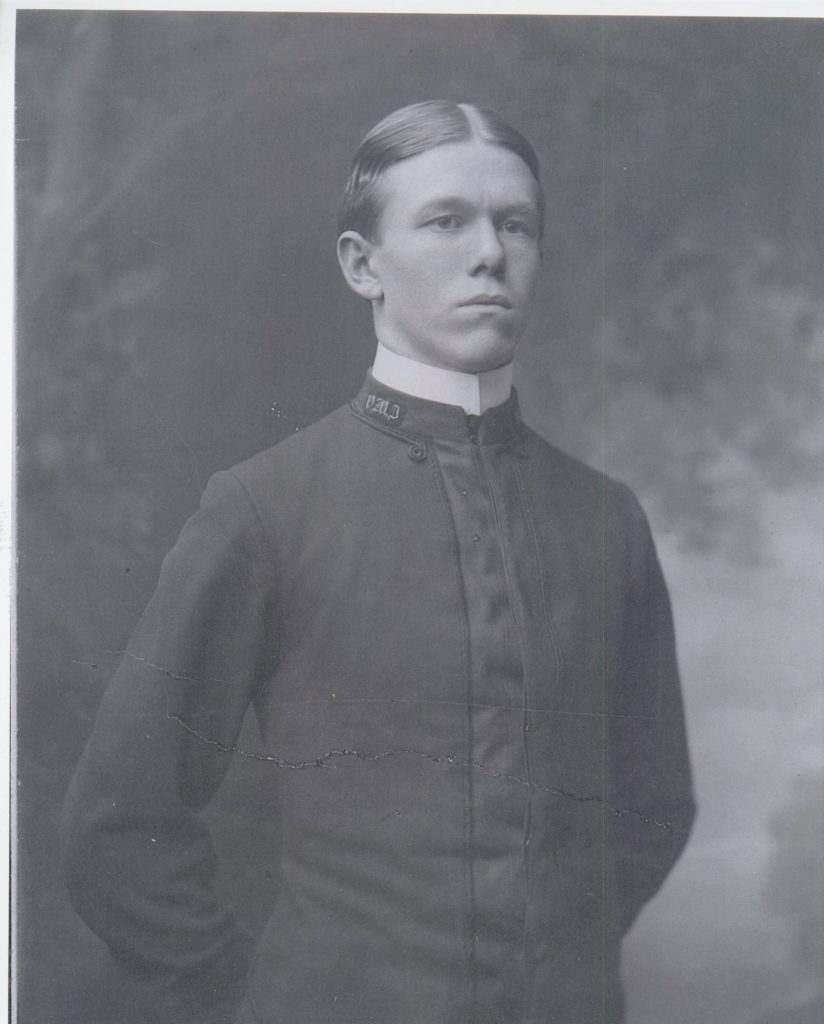
Cadet George C. Marshall at the Virginia Military Institute.
George Marshall graduated from the Virginia Military Institute in 1901, at age 20. He wanted to commission into the U.S. Army Field Artillery, but the Army was very small and the need for officers largely fulfilled by the U.S. Military Academy. The size of the Army was not his only hurdle; his parents were not in favor of Marshall having a military career.
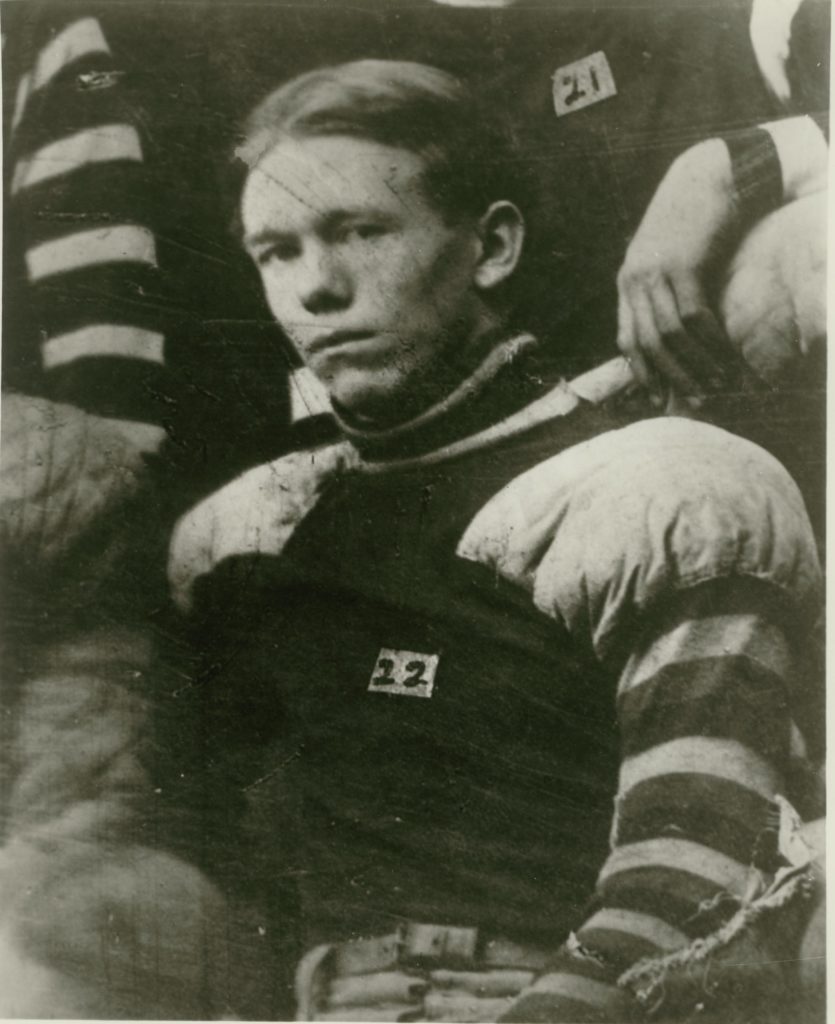
Marshall showed determination early in his life. Here as a VMI football player.
Marshall was not a young man willing to take “no” for an answer, and was impatient to begin his career for more than one reason. The Army demanded that lieutenants commission as single men; Marshall was engaged to Lily Coles of Lexington, VA, and they were eager to wed after he was commissioned.
He traveled to Washington, D.C., to seek assistance in taking the necessary exam to commission from personnel in the War Department. He even made a visit to the White House (without an appointment) and managed to sneak into a group visiting the President!
I went to the White House and I had no appointment of any kind. I sat there and watched people go in by appointment-I suppose ten or fifteen-stay about ten minutes and then be excused. Finally, a man and his wife and daughter went in … and I attached myself to the tail of the procession and that way I gained the president’s office. After these people met the president-they merely wanted to meet him and shake hands with him-they went out and left me standing there. Mr. McKinley, in a very nice manner, said what did I want. I stated my case to him. I don’t recall exactly what I said, but from that I think flowed my appointment, rather my authority to appear for examination.
A recommendation letter from Virginia politician John S. Wise to Maj. Gen. John R. Brooke on the examining board stated:
This will be presented to you by my young friend Geo: C. Marshall jr, who goes before your Board for examination. I sincerely hope he may succeed. This boy has the very highest testimonials. He was first Captain at the Va Mil: Ins: & had a good class standing. Gen: Shipp, the Supt regards him as one of the fittest pieces of food for gunpowder turned out by his mill for many years.
Marshall got to take the commissioning exam in September 1901 at Governor’s Island, NY. Following the exam, he wrote VMI Superintendent Gen. Scott Shipp at length about his experience:
On Tuesday I stood arithmetic, algebra and geometry.
The first two were extremely simple, all the fundamental operations such as addition, subtraction and multiplication and one simple problem. The Geometry was hard, much harder than I had understood it would be. There were five questions, four of them demonstrations and one problem. I was fortunate in having glanced at each demonstration we were given before I went in or I think I would have failed, as it was I practically maxed it, I think.
On Wednesday I stood Logarithms, Trigonometry, Surveying and Geography. All the questions on the first of these were simply for definitions and all very easy. The Trigonometry was fairly hard, solutions of right triangles and relation of different functions of angles. The Surveying was easy and only required common sense, such questions as solution of angles given sides in chains &c., percent of grade and similar questions. The Geography was catchy as it usually is according to accounts I have heard, but I had prepared for such questions. They asked what states crossed by lines through different points, the location of the newly acquired possessions of the U.S., and capes and bays, especially those in the vicinity of some country over which there has been discussion at any time.
On Thursday I finished up the mental taking exams in Grammar, History, Constitutional Law and International Law. In the Grammar they asked definitions and how to form plurals and feminines of words and also gave a sentence to analyze.
The History was extremely general the questions covering all countrys (sic), particularly Italy and the U.S. One question was “Locate, describe and give seating capacity of the Coliseum”. Luckily I have read a great deal and found ready answers to most of the questions in the History. The Constitutional Law was long but I am positive I maxed it. All the questions were on the Constitution itself. I had only looked at the International Law given in the back of our Government Law book and not a question on the examination was answered in it. I had to use my head and guess and I found out afterwards that I got all but one question practically right. The questions were such ones as “Discuss the International Law in connection with the St. Lawrence River as a boundary line”, “What is the marine League and give reasons for having such an agreement?”, “Discuss the general principles of allegiance”, &c.
On Friday we were each given a company to drill. It was optional with the civilians but I took it, thought I was the only one who did so. I had to put the company through the ordinary movements. The physical examination was strict but I was not given any reason to claim any failure, if I am so unfortunate, on that part of the examination. I am not yet informed as to the question about my age but from what little General Brooke would tell me it will be all right. I expect to hear the result in about three weeks or a month.
While waiting for the Army’s decision, Marshall became commandant of students at the Danville Military Academy in Danville, VA when classes began that fall. His exam was scored in early October.
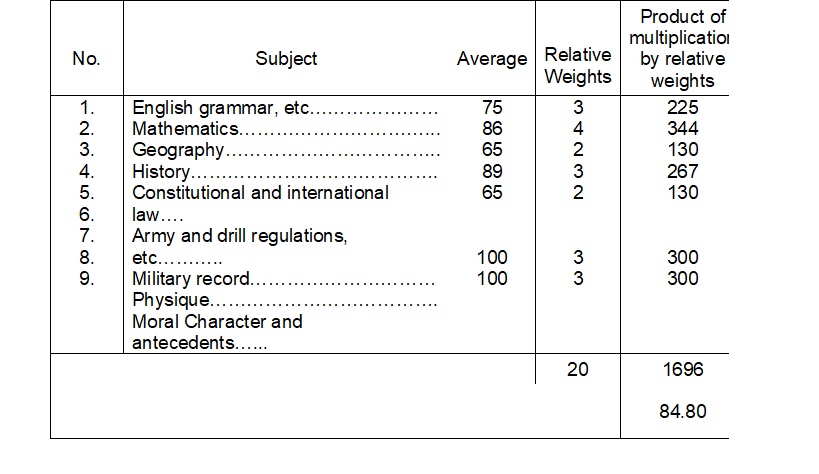
Marshall’s Army entrance exams scores. Prospective officers needed at least a 70 to qualify, and Marshall received some of the best scores in his group.
The Army noted that Marshall was “well qualified” to be an officer in the U.S. Army, but it required commissioning lieutenants to be 21 years old, and since Marshall was still 20, his results were held until closer to his December birthday.
On December 12, Marshall happily wrote Gen. Shipp again, “I am glad to be able to tell you that I have received a letter from the War Department telling me that I passed my examinations successfully, and was recommended for a commission as lieutenant in the Army after becoming of age. The commission is to be sent after December 31st. A little late, but very acceptable Xmas gift.”
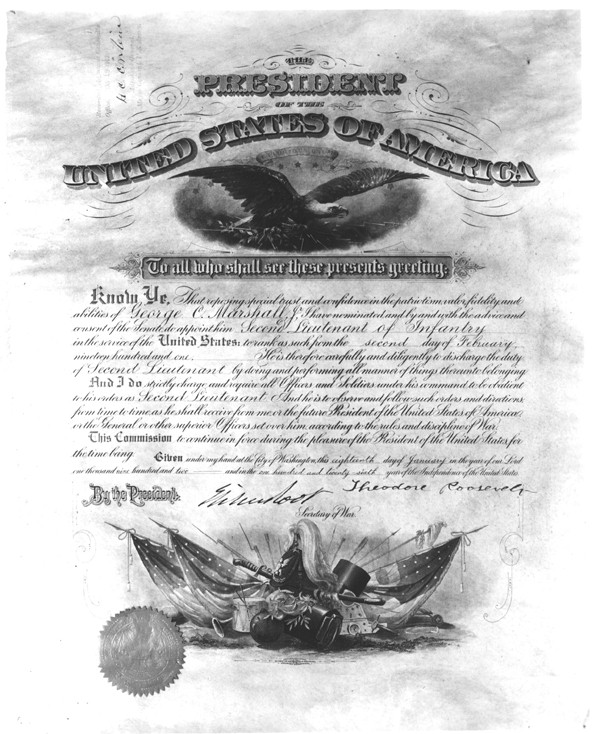
Marshall’s commission.
Marshall received his commission on Feb. 3, 1902, signed by President Teddy Roosevelt, and was immediately sworn into the U.S. Army. He was commissioned into the Infantry, not the Field Artillery, as there was no current need for a second lieutenant in the Field Artillery.
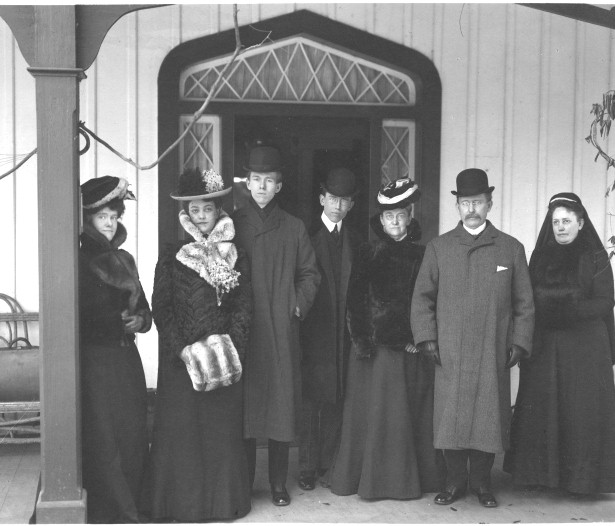
The Marshall’s wedding party. Marshall and his bride, Lily, are second and third from the left.
A week later, he and Lily were married at her mother’s home in Lexington, VA. Marshall was due to report to Washington, D.C. by Feb. 13, so there was no time for a honeymoon. A kind officer in D.C. gave them a few extra days, but within a week of getting married, Marshall was on his way to an unaccompanied 18-month tour in the Philippine Islands.
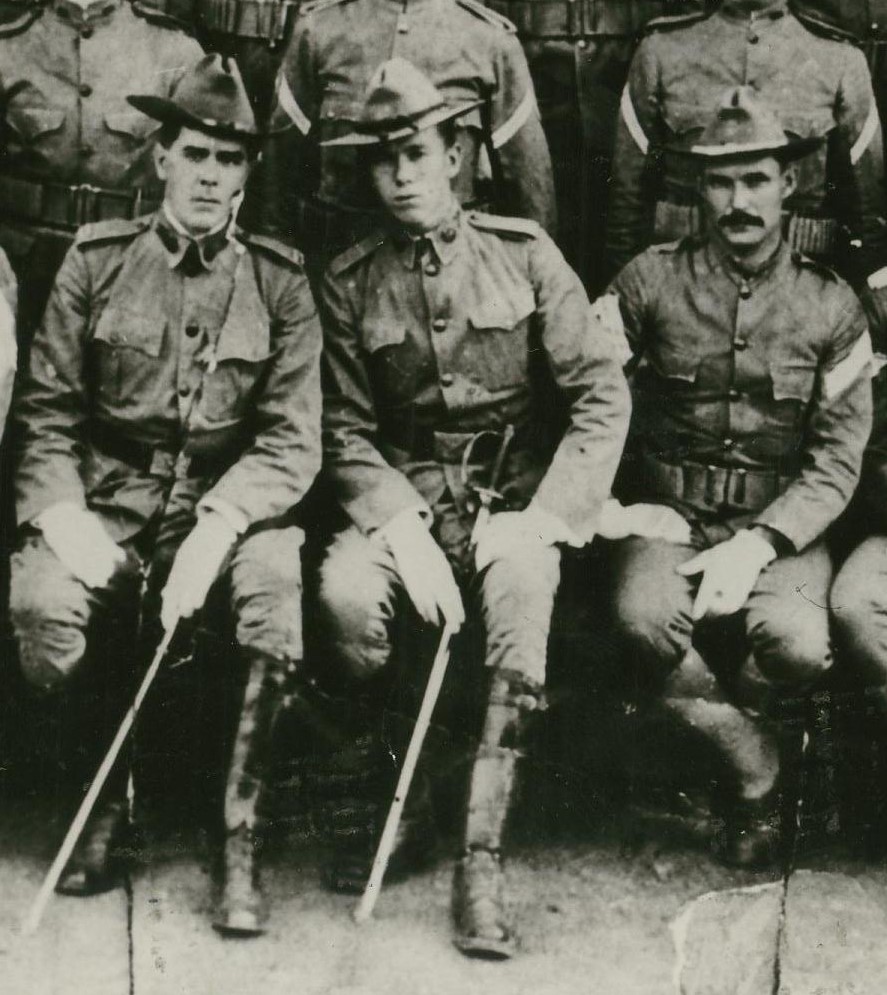
One of the earliest photos of Marshall (center) in the Army, taken in 1902 in the Philippine Islands.
Before becoming director of library and archives at the George C. Marshall Foundation, Melissa was an academic librarian specializing in history. She and her husband, John, have three grown children, and live in Rockbridge County with three large rescue dogs. Melissa is known as the happiest librarian in the world! Keep up with her @MelissasLibrary.
